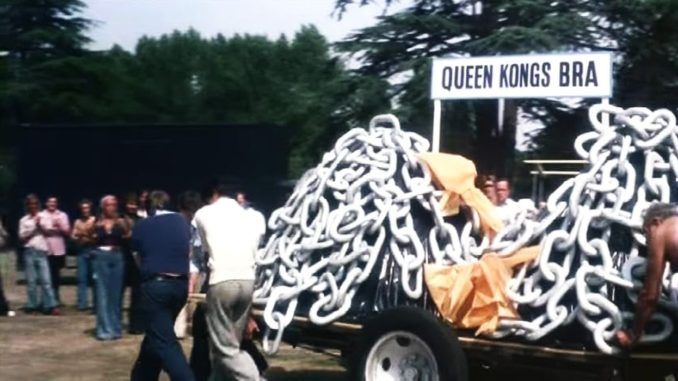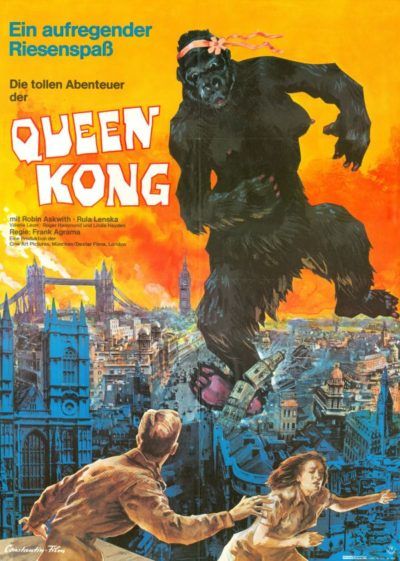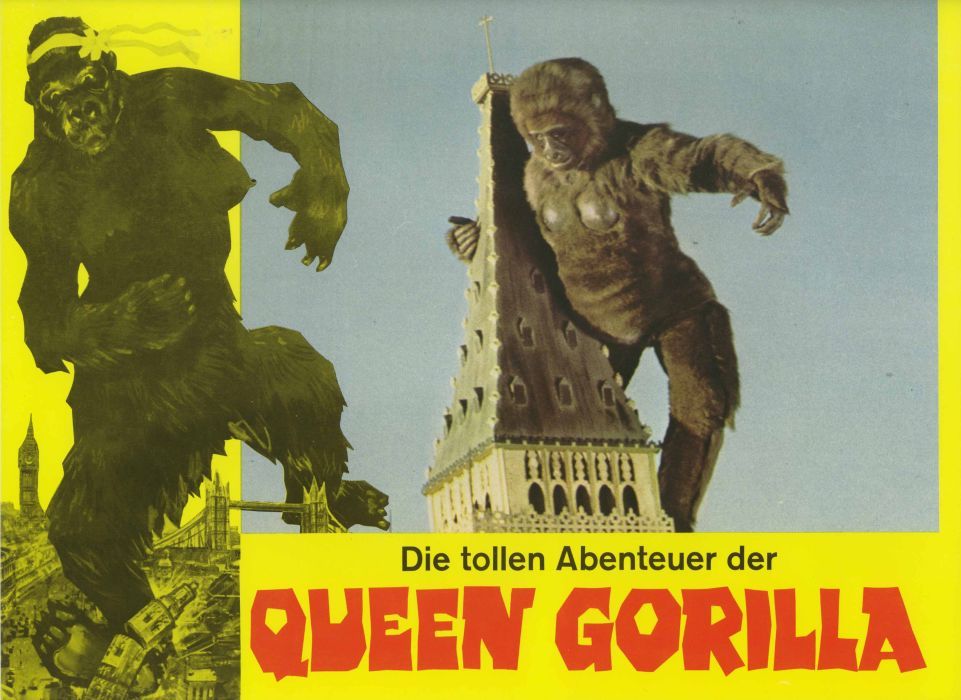
Rating: B-
Dir: Frank Agrama
Star: Rula Lenska, Robin Askwith, Roger Hammond, Valerie Leon
This was, for several decades, almost a legendarily unavailable movie. Production on it had been brought to a screeching halt by a lawsuit from the De Laurentiis Entertainment Group. They had their own version of the large monkey story coming out, and were not going to let some cheapjack bunch of Limeys (and an Egyptian) ride their coat-tails. While the film was eventually completed, there wasn’t even a cast and crew screening in the UK. But it somehow acquired a cult following in Japan, where a troupe of comics re-dubbed it with their own script. It was released on DVD there, and this eventually paved the way for it to be seen in Britain. By this point, the De Laurentiis family had presumably realized that reminding anyone of the disaster which was their 1976 King Kong was probably a bad idea, and silence was the best policy.
I suspect if you had been eagerly waiting over the decades for it to show up, then disappointment was likely inevitable. But, having watched it mostly because an ex-workmate drew my attention to it (thanks, Robert!), I was surprisingly well-amused. It is, absolutely, a time-capsule of the time and place where it was produced. The summer of ’76 was renowned across the UK as the hottest in 350 years, and a film like this, fits into the zeitgeist perfectly. Lenska was a star of TV show Rock Follies, which hit the airwaves that February, while Askwith was known as the cheeky lead in the Confessions series of sex-comedies (basically, Carry On Shagging). Their pairing, along with a spoof which is as much of British culture and mores of the time as specifically King Kong, is largely what I would expect.
 It begins with a man being chased through a “jungle”, which is obviously a patch of English woods, by “natives” who are equally clearly more familiar with C&A than Central Africa. However, in an amusing bit of meta-cinema, it turns out to be a test shoot for a film being made by Luce Habit (Lenska). She bemoans the lack of suitable leading men, until she stumbles across Ray Fay (Askwith), pinching a poster of the original King Kong. He is deemed suitable, and basically abducted onto Luce’s boat, the Liberated Lady, which sets sail for Africa, the location for her movie, with her all-female crew. They burst into song as they depart, the lyrics both name-checking Germaine Greer, then rhyming Munich with eunuch – as in The Female Eunuch, her famous book. I genuinely did not see that coming.
It begins with a man being chased through a “jungle”, which is obviously a patch of English woods, by “natives” who are equally clearly more familiar with C&A than Central Africa. However, in an amusing bit of meta-cinema, it turns out to be a test shoot for a film being made by Luce Habit (Lenska). She bemoans the lack of suitable leading men, until she stumbles across Ray Fay (Askwith), pinching a poster of the original King Kong. He is deemed suitable, and basically abducted onto Luce’s boat, the Liberated Lady, which sets sail for Africa, the location for her movie, with her all-female crew. They burst into song as they depart, the lyrics both name-checking Germaine Greer, then rhyming Munich with eunuch – as in The Female Eunuch, her famous book. I genuinely did not see that coming.
They arrive in “Lazanga, where they do the conga” – a joke which isn’t so much running, as driven relentlessly into the ground – which looks suspiciously like the the same patch of forest used above. Mind you, it’s all consciously anachronistic. They take credit-cards, sell “Konga Cola” and, most bizarrely, the local kids bounce around on space-hoppers. There’s also a joke about a phone-call for Mr. Tarzan: “Your wife Jane is on the other vine.” Whether you groan at that or not is likely a good litmus test for the movie as a whole. The local matriarchal tribe, ruled over by Valerie Leon, want Ray as the bride of Queen Kong. When Luce demurs, they simply kidnap him, and offer him up in a giant birthday cake. This is when we see Ms. Kong for the first time, and… it’s not good. Basically, a gorilla costume with tits sewn onto it.
She takes Ray off into the jungle, with Luce and her crew in pursuit. We get to see a couple of equally crappy-looking dinosaurs: if only they’d had the budget to hire Ray Harryhausen, for a couple of One Million Years B.C. sequences. Instead, it’s probably the most uninteresting section of the film, ending when Luce uses gas bombs to knock Queen Kong out, and take her back to London for display. You won’t be at all surprised to learn that she escapes (after an argument over whether they need to put a bra on Kong, top), and goes on the rampage, with Big Ben standing in for the Empire State Building. But in a rather unexpected twist, Ray has fallen for her, and his rousing feminist speech is broadcast over the TV coverage, an army of women descend on London to stop the military from gunning the Queen down. He then returns to Lazanga with his bride: in this version, beauty does not kill the beast.
Make no mistake: this is unsubtle, juvenile comedy, not the works of Wes Anderson. But if you care to look (not that I’d expect most to do so), there’s a fair amount of interesting sexual and racial subtext here. It’s pro-feminist, sometimes surprisingly so… yet if ever there were an example of the “male gaze,” this would be it, with virtually every female character attractive and/or scantily-clad. The sole exception is likely renowned lookalike Jeannette Charles, playing H.M. Elizabeth II, as she did in everything from The Naked Gun to Austin Powers: Goldmember [and who has outlived her monarch!] It also slyly acknowledges the double-standard of the British attitudes of that time towards immigrants, the Queen of Lazanga muttering “Bloody foreigners” after encountering Luce and her crew.
 Very similar, is the line, “I think we’ve been having this problem, since we British started to let these bloody foreigners in. I mean, you don’t see an English gorilla behaving like that, do you?” What’s amusing is, it’s delivered by Indian actor Dino Shafeek, who’d be familiar to Brit audiences from his role in sitcom It Ain’t Half Hot Mum. Further fun is had, spotting other recognizable faces, such as Carol Drinkwater (All Creatures Great and Small) and Vicki Michelle (‘Allo ‘Allo), in minor roles. Linda Hayden, from Blood on Satan’s Claw, also turns up, playing an obnoxious singing nun on an aircraft, a full four years before Airplane! went there. Indeed, this could be a primitive predecessor, taking potshots at all and sundry, such as when a lipstick sporting “Lady Jaws” pops up out of the water, or when a T-Rex’s smile is compared to Jimmy Carter.
Very similar, is the line, “I think we’ve been having this problem, since we British started to let these bloody foreigners in. I mean, you don’t see an English gorilla behaving like that, do you?” What’s amusing is, it’s delivered by Indian actor Dino Shafeek, who’d be familiar to Brit audiences from his role in sitcom It Ain’t Half Hot Mum. Further fun is had, spotting other recognizable faces, such as Carol Drinkwater (All Creatures Great and Small) and Vicki Michelle (‘Allo ‘Allo), in minor roles. Linda Hayden, from Blood on Satan’s Claw, also turns up, playing an obnoxious singing nun on an aircraft, a full four years before Airplane! went there. Indeed, this could be a primitive predecessor, taking potshots at all and sundry, such as when a lipstick sporting “Lady Jaws” pops up out of the water, or when a T-Rex’s smile is compared to Jimmy Carter.
While the monkey suit is no great shakes, to put it mildly, I found the actual effects work by no means bad. Sure, it’s ultra-cheap, but if you compare it, say, to what Toho was doing around the mid-seventies, some shots hold up their end well enough. A miniature village at then recently opened (by Arthur Askey, no less!) Dorset theme-park of Tucktonia stood in for London, as it did in Lifeforce. Quite what Egyptian businessman Agrama was doing at the helm here is less clear, though he did make some other low-budget films and had quite the career. After this, he went on to form US distribution company Harmony Gold (who distributed Robotech in the US) and ended up convicted for tax evasion alongside former Italian prime minister Silvio Berlusconi, before dying in April at the age of 93.
This would certainly make a lovely double-bill with A.P.E...
